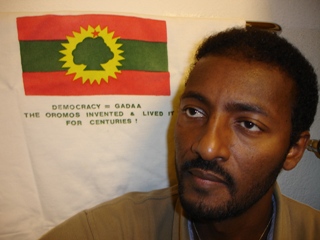UNHCR honors World Refugee Day
 Oromo culture takes vivid form onstage.
Oromo culture takes vivid form onstage.Written By: Thuria Ghaleb
Article Date: Jun 26, 2007
Scores of refugees, especially Somalis, gathered on Wednesday at the Cultural Center in Sana’a to commemorate World Refugee Day and honor the refugee experience. The United Nations High Commissioner for Refugees in Sana’a conducted this celebration, the slogan of which was In Order Not to Forget the Refugees, in cooperation with the Interaction Development Foundation. The refugees thanked the efforts made by the UNHCR to improve the refugees’ conditions in Yemen, but they still asked the UNHCR to find solutions for the problems they face in Yemen.
According to the refugee representative’s statement, many male refugees are sitting jobless on the pavements, especially Somalis. This has forced Somali women to provide much of their families’ incomes. They are compelled to work at a number of jobs in order to meet their families’ basic needs. “My husband died, so there is not any other one else to be responsible for our expenses in this life. I worked a lot of jobs to support my family. I am now responsible for myself and my three children,” said Amnah Abdullah, 45, a Somali refugee who has lived in Yemen for 13 years. Others have similar struggles.
“My husband is alive but he is jobless,” said Zainab Musa, 30, a Somali refugee who has lived here for 15 years and has five children. “I faced a lot of difficulties to pay the rent of the house, because it is increasing. The rent was YR 8,000 and then it increased to YR 20,000. I also pay the fees of the water and electricity. I am now afraid of increasing these fees this month. The UNHCR was responsible to support us with the costs of medicines but we are now responsible for these costs.” The refugees also asked the UNHCR to find a solution for their secondary school students.
A lot of those high-school graduates left their secondary schools with high rates qualifying them to study in the universities, but they were not accepted to continue their studies in Yemeni universities. “I graduated from the secondary school, but I am now sitting at home because I am not accepted in the Yemeni universities,” said Asia Ahmed, 23. “I lived in Yemen since I was just five years old. But I never forget my country; this day just makes us remember our more than any other day and in a collective way. I remember my country when I am at home, walking in street, receiving friends or new refugees from far and different countries.
A limited number of refugees are accepted to study in the Yemeni universities after facing a lot of difficulties.” “I am eager to see my children, because I did not see them for about 15 years. They are in Somalia and there is not any way to see them,” said Makkah Abdi, 45, a Somali refugee. The event began at 10 a.m. The National Somali Anthem was sung by a Somali band. The Somali refugees stood to show respect for their homeland. A lot of Somali songs were played by Somali bands, which made a lot of older refugees cry. A number of Somali female refugees were honored by the IDF because they represented good examples of working refugee women.
The United Nations General Assembly designated June 20, 2001 as World Refugee Day to recognize and celebrate the contribution of refugees throughout the world. Since then, World Refugee Day has become an annual commemoration marked by a variety of events in over a hundred countries. This year, the UNHCR commemorated World Refugee Day for this sixth time with the theme “A New Home, A New Life,” in order to draw the public’s attention to the millions of refugees worldwide who are forced to flee their homes, and their contributions to their new communities. Pursuant to the Refugee Act of 1980, the United States defines a refugee as a person who is unable to return to his or her country of origin because of a well-founded fear of persecution, based on their race, religion, membership in a particular social group, or political opinion.
Some 40 million people worldwide are already uprooted by violence and persecution, and it is likely that the future will see more people on the run as a growing number of push factors compound one another to create conditions for further forced displacement. “I have spent the past few days in Sudan, a country at the epicenter of one of the world’s great displacements. Here I have seen firsthand the stark reality of forced displacement as well as some of the solutions,” said UN High Commissioner for Refugees, Antonio Guterres, in his message on this day, which was delivered by Dr. Adel Jasmin, a representative from UNHCR.
“But there’s good news too, as here in the remote south of Sudan, where tens of thousands of Sudanese refugees are making the choice to return to their devastated homeland after decades of conflict. Although largely unreported, they are coming home with UN help from refugee camps in Uganda, the Democratic Republic of the Congo, Kenya, Ethiopia and the Central African Republic. Others are returning from exile in Libya and Egypt, as well as from other parts of Sudan itself.” “It is time to recognize that we are facing what is nothing less than a new paradigm of displacement in the 21st Century.
There are no easy answers, but while the international community grapples with the root causes of displacement, it must pay more attention to protecting the vulnerable and building opportunities for their futures,” he said. Today people do not just flee persecution and war but also injustice, exclusion, environmental pressures, competition for scarce resources and all the miserable human consequences of dysfunctional states. “And then there are the stateless, those who because of their ethnicity or history are simply denied the right to a nationality.
For them, “going home” may not depend on a peace accord and repatriation, but rather, on overcoming bureaucratic obstacles and securing an official identity. Though the estimate of stateless people worldwide has six million in some 60 countries, the figure signals growing international willingness to recognize and address the problem,” said the Secretary-General of the United Nations, Ban Ki-moon, in his message on this day.



0 Comments:
Post a Comment
<< Home